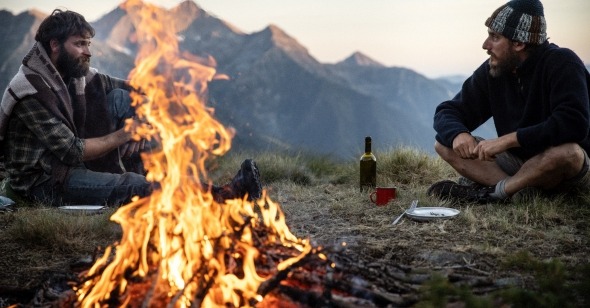Where the Air Is Clear
By Chris Shields
The Eight Mountains
Dir. Felix Groeningen and Charlotte Vandermeersch, Italy/Belgium/France, Sideshow/Janus Fims
After returning from the Himalayas, Pietro (Luca Marinelli), a restless soul, tells his longtime friend, Bruno (Alessandro Borghi), a man with a deep connection to his native soil, about “the eight mountains.” Pietro draws a circle made up of mountains with one in its center, explaining that there are two ways to live: one can explore all the mountains making up the perimeter of the diagram or cultivate a life on the center mountain. Bruno has chosen the latter, returning to his roots as a farmer and running a rustic dairy in the mountains of his boyhood. Pietro, an aspiring writer who works odd jobs in Turin, only returns to the mountains during the summer to visit his friend and enjoy the small stone house they built together with their own bare hands. The lives of these two men, made up of connections and divergences, trace a Hesse-like path through modern existential anxieties and the pursuit of spiritual fulfillment among lush mountain forests and icy peaks.
Based on Paolo Cognetti’s 2016 novel, winner of the Premio Strega, Italy’s most prestigious literary prize, Felix Groeningen and Charlotte Vandermeersch’s The Eight Mountains brings the parabolic simplicity and rich psychological detail of the book to the screen with mesmerizing photographic beauty and stellar performances. Beginning in the early 1980s, the film follows Pietro as a young boy in Turin, who vacations with his parents at their modest mountain home. Pietro’s father is an avid mountain climber, and the boy accompanies him on his daily trips. While out playing on his own, Pietro meets Bruno, a local, and the two become fast friends. Eventually, Bruno joins Pietro and his father in their climbing. While ascending a particularly snowy peak, Pietro faints and the expedition ends on a dramatic and sour note.
The boys grow closer, and Pietro’s parents offer to take Bruno to Turin so that he may get a proper education, but his largely absent father refuses, whisking the boy away with him to work as a bricklayer. As time goes on, Pietro begins to rebel; his father is an irritable and serious man who only comes alive in the mountains. The film jumps forward into Pietro’s teenage years, when the relationship has deteriorated even more. After a nasty argument in which Pietro tells his father that he has wasted his life, the boy leaves. After another leap in time Pietro is now a man in his thirties leading an unmoored existence, estranged from his parents, when he receives a phone call telling him that his father has suddenly died.
Pietro returns to the family’s mountain getaway, encountering Bruno again for the first time in many years. Bruno takes Pietro to a stony ruin on a mountainside and tells him that Pietro’s father’s last wish was to build a house in the remote spot, explaining how he and the man forged a strong bond, continuing to climb mountains together during his son’s long absence. To honor the man’s final wishes, Bruno intends to build the house on the mountainside, but the work will go faster if he has a laborer. Together the two boyhood friends work on the unforgiving terrain, reconnecting with each other and, in Pietro’s case, the world he left behind. He climbs to the peak he was unable to reach long ago, calling down to Bruno, who shouts back Pietro’s childhood nickname, “Berio” (rock) in the local dialect. After this perfect moment, though, life begins to get more complicated as Bruno struggles to bring his family’s dairy back to life and Pietro searches near and far for his own sense of purpose.
Groeningen and Vandermeersch’s film has a knack for unexpected turns, avoiding the obvious in favor of sly emotional crescendos. The Eight Mountains takes care to do just enough dramatic sculpting to make sure its emotional inflection points resonate. When Pietro decides to hike to the peak, it is because of Bruno’s insistence, subtly indicating that there is something important to be found there. As he climbs, the music of Swedish singer-songwriter Daniel Norgren creeps in on the soundtrack (an effective sonic motif used throughout), yet we are still able to hear the dull, human sounds of Pietro’s labored ascent. It’s a simple act but one loaded with symbolic power. Groeningen and Vandermeersch’s narrative approach is generous, with unhurried pacing allowing for a cumulative emotional effect built from its series of mini climaxes. Like its mountain setting and the bracing, bittersweet vision of life found there, The Eight Mountains provides the viewer with plateaus to stop and reflect.
Luca Marinelli dazzled audiences with his mercurial performance in 2019’s Martin Eden, transforming on screen from a provincial boy to an aged, wild-eyed political radical, a turn reminiscent of Helmut Berger’s descent into decadent madness in Visconti’s Ludwig. The versatile Italian actor, who recently played Italy’s most famous comic character, Diabolik,brings Pietro to vivid life with sensitive naturalism, a world of thoughts and emotions swimming in his large, watery eyes. Both Marinelli and Borghi’s understated performances contrast pointedly with the film’s majestic settings. In The Eight Mountains, the world is both big and small, and open to being pursued from either perspective. Both Cognetti’s novel and Groeningen and Vandermeersch’s film revel in the profundity implicit in their mountain imagery and symbolism, but never lose sight of the people, struggling to reach their own lofty peaks. It’s often the restrained emotions, the unspoken implications, and grace notes that lend quiet grandeur to a film that already is mapped to a grand scale.
